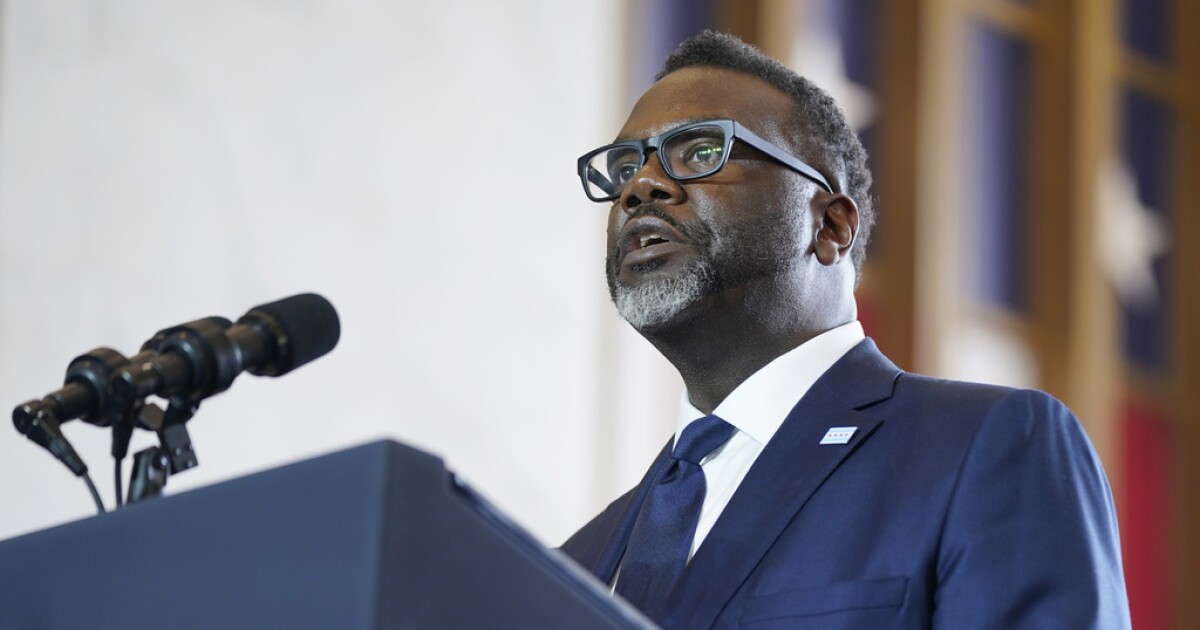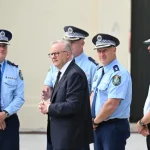

Six months after Democratic Chicago Mayor Brandon Johnson’s inauguration, city residents are not pleased with his administration’s work, earning him the lowest approval rating for a Windy City mayor starting his or her term in modern history.
Historically, Chicago mayors have been popular early in their terms, but that is not the case for Johnson. A poll from the Illinois Policy Institute conducted by conservative-leaning Echelon Insights found that Johnson has a 28% approval rating. The rating is just 1 point above former Mayor Lori Lightfoot’s when she lost her reelection campaign in February and 1 point above former Mayor Rahm Emanuel’s in 2016 in the aftermath of the officer-involved shooting of 17-year-old Laquan McDonald.
BURCHETT DOUBLES DOWN ON MCCARTHY ASSAULT CLAIM: ‘SPIRALING OUT OF CONTROL’
The only other mayor to come close to a low score of 30% is former Mayor Michael Bilandic, who scored 33% in 1979, according to the Illinois think tank.
Johnson’s approval rating was the highest among ages 18-29 at 32% and lowest among ages 40-49 at 24%. The polling numbers likely correlate with Johnson’s outreach goals for teenagers and youth, who tend to connect with liberal policies, as well as a decline in support from older voters, who leaned toward Democrat Paul Vallas in the mayoral election earlier this year.
During the April runoff election, Johnson was backed by 58.2% of voters ages 18 to 34 and 45.7% of voters ages 35 to 49. Vallas had the advantage with older voters, with 50.6% of voters 65 and older and 53.4% between ages 50 and 64 supporting him.
Johnson’s low approval rating is a signal that Chicago may not be responding to his liberal policy agenda, which he heavily campaigned on in the election. He ran his bid for the mayorship on comprehensive approaches to public safety and education that include criminal justice reform and an emphasis on mental health.
The poll found Johnson had the highest disapproval rating in crime and public safety at 66%, followed by 64% in immigrant management and 63% in housing and homelessness.
When asked what the biggest problem facing Chicago is, 69% of respondents said crime, and 52% said they strongly disapprove of Johnson’s approach to crime. Seventy-three percent of voters support a larger police presence in the city. On the campaign trail, Johnson said he would move to promote officers with the Chicago Police Department as it struggles with over 1,000 vacancies.
Since taking office, Johnson has pushed for tax increases to aid homelessness, defended teenage rioters, appointed a new police superintendent and restructured the Chicago school board, authorized the creation of permanent tent camps for immigrants, and called on the government to fast-track work permits for immigrants as Chicago experiences an influx from southern border states.
In July, the Chicago City Council approved resolutions to hold hearings on mental health, including one called “Treatment Not Trauma” that would help the Chicago Police Department respond to mental health crises, a pillar in the Democratic criminal justice restructuring agenda. Council members also approved transforming a motel into a housing and social services site for homeless people struggling with mental health and substance abuse.
Forty-six percent of Chicagoans oppose the real estate tax increase that will be on the March 2024 ballot, and 63% of Chicago residents oppose sheltering immigrants in heated tents this winter, according to the poll.
“Six months into the new administration, these poll results are a call from Chicagoans to Mayor Johnson to change course. Chicago is a world-class city, and the mayor’s office has a great opportunity to solve issues that would make it more appealing to live here,” said Josh Bandoch, head of policy for the Illinois Policy Institute. “Fortunately, Chicagoans are also pointing the way forward for the mayor. Mayor Johnson can regain popular support by focusing on lowering crime, lowering taxes, and making the city more attractive for businesses.”
CLICK HERE TO READ MORE FROM THE WASHINGTON EXAMINER
The Lincoln poll surveyed 800 registered voters in Illinois between Oct. 18-22, 2023, with a 4.4-point margin of error.
The Washington Examiner reached out to Johnson for comment.





